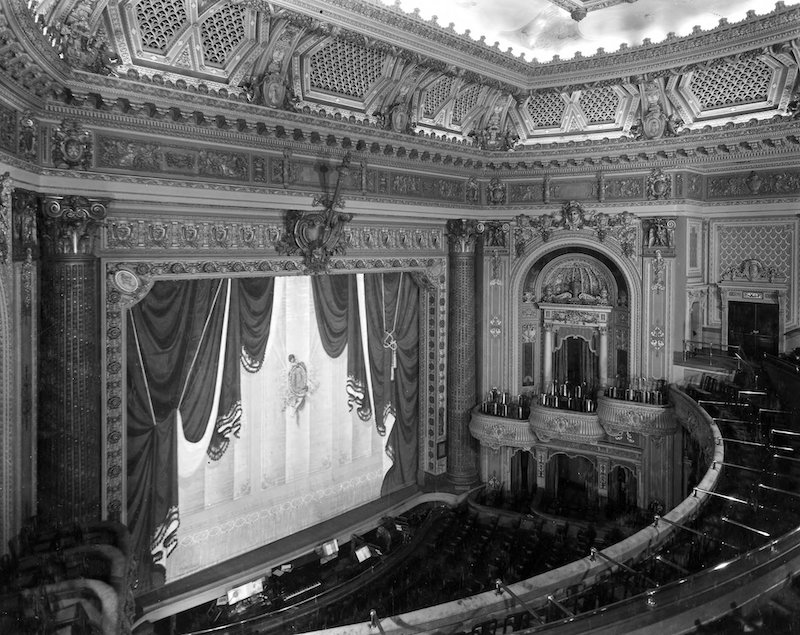
SALT LAKE CITY ― In mid-March, the future of the Utah Pantages Theatre hung by a thread as supporters fought in court to stop developers from demolishing the once-glamorous century-old structure on Main Street.
On March 8, Third District Court Judge Robert Faust denied Friends of the Utah Pantages Cinematic Theatre’s request for a temporary restraining order that would block the wrecking ball’s blows while their case gets fully litigated.
But with that denial, Faust granted Friends the chance to amend and strengthen their request.
The nonprofit Friends ― which formed last June – includes case plaintiffs Michael Patton, Derek Bleazard, Casey McDonough and Ibrahima Fall, who filed their initial complaint in February against Salt Lake City Corporation and its Redevelopment Agency – a municipal board made up of Mayor Erin Mendenhall and city council members.
Patton, a self-described filmmaker and activist, said they planned to revise their request, add more defendants, and resubmit to the court as soon as possible.
“I found out about the theatre about 10 years ago when the city first bought it, and I was excited they were going to restore it,” Patton said. “But then in 2019, we found out about this new deal to destroy it.”
Since then, he’s been spearheading the effort to save and restore the Pantages theatre, which he considers both historically and culturally significant.
McDonough, an architect, worked to help establish the theatre’s eligibility for the National Register of Historic Places, an action that the State Historic Preservation Office had recommended the Redevelopment Agency pursue in 2019, according to court documents.
On November 4, 2021, Salt Lake City’s Historic Landmark Commission unanimously approved making that recommendation of eligibility to the State Historic Preservation Office.
However, prior to the State Office’s scheduled meeting on November 18, the city conveyed the property’s title to Main Street Tower Owner, LLC ― a subsidiary of the Texas-based Hines Acquisition company.
In a November 10 letter to the Utah Division of State History, Main Street Tower’s attorney Bruce Baird detailed his opposition to that historic designation.
“The unfortunate reality is that the property is beyond repair and there is not a financially viable use for restoration,” Baird said in his letter.
But Patton disagrees, convinced that Pantages is a treasure that can be restored and once again bring in revenue.
“Pantages is not in a vacuum,” Patton said, noting its place among others designed by renowned architect B. Marcus Priteca. “There’s a Hollywood Pantages, one in Tacoma almost identical to ours, and also one in Toronto/Minneapolis.”
Patton also questioned the city’s projected restoration estimates.
“The RDA has been inflating these numbers for years, saying it would cost $60 to $80 mil to restore,” Patton said.
According to Historic Theater News, restoration of Tacoma’s historic Pantages cost less than $25 million, which included seismic upgrades. That work finished in 2018.
“It’s very doable,” Patton said of the Salt Lake City Pantages restoration, noting that landing a spot on the National Register would open the door for federal tax credits to help fund it. He also believes that grants, private donations from benefactors and other sources could be found to get the job done.
In December 2019, the Redevelopment Agency sold the property ― which was then valued at just over $4 million ― to Hines for $0.
That agreement came with the stipulation that a mid-block walkway and family-friendly park with an entertainment venue would be included in the project. The developer also agreed to provide at least 10 percent of the housing units in the proposed mixed-use tower to households making 60 to 80 percent of area median income.
The court document filed by Main Street Tower Owner LLC in opposition to the temporary restraining order described what they considered to be excessive behavior on the part of Patton and other plaintiffs.
“This is not Plaintiffs first, second or even third attempt to derail MSTO’s redevelopment efforts,” Baird said in the filing, noting their vigorous opposition at several City Council and RDA meetings, trespassing in the theater, along with a “smear social media campaign slandering Salt Lake City officials.”
Baird also wrote that a wrongful injunction blocking demolition could incur annual costs in the tens of millions of dollars due to delays in the property’s development.
“The injunction would adversely affect the public interest,” Baird concluded, urging denial of the temporary restraining order.
Depending on the court’s ultimate decision, demolition could begin shortly, rendering any further legal action to save Pantages moot.
RELATED CONTENT
Broken Promises — Historic Utah Theatre donated to a developer with an affordable housing promise.
Cronyism and Corruption in Utah: Investigative Journalist Eric Peterson
Homeless Advocate Claims SLC Mayor Has a Conflict of Interest in Handling Homeless Situation
Former Utah Mayor Rocky Anderson—”I think the people should rise up!”
A brief history of newspapers in Utah
San Rafael Secrets: What Did Madame Marie Curie Do in the Middle of a Utah Desert?
Utah Volcanoes & Massacres: A Tour of Southern Utah’s Violent Past
Subscribe to Utah Stories weekly newsletter and get our stories directly to your inbox





